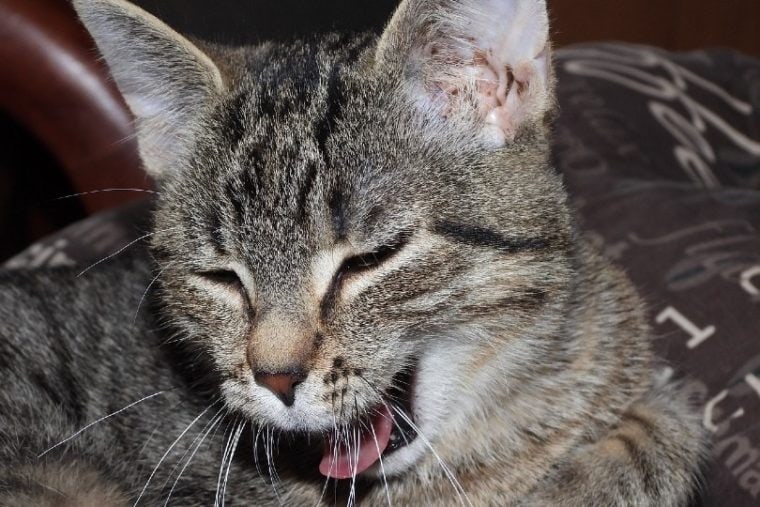
Click to Skip Ahead
Hairballs can be a fact of life for most cat owners. At some point or other, those adorable felines resort to gagging, heaving, and throwing up a rather disgusting pile of slimy fur.
But perhaps your cat has been making coughing noises lately, and you’re not sure if they are trying to cough out a hairball or if there’s something else going on.
Here, we look at the differences between coughing and vomiting hairballs in cats and when it might be time to make an appointment with your veterinarian.
 What Is the Difference Between Coughing and Vomiting?
What Is the Difference Between Coughing and Vomiting?
Sometimes, coughing and vomiting can be difficult to distinguish. Some cats might make coughing noises before they start retching and eventually vomiting.
What Can Cause Coughing in Cats?
About Hairballs
Now that you know the common reasons that you might hear your cat coughing, let’s take a closer look at hairballs. For the most part, hairballs are somewhat normal, but a cat that throws them up too frequently might have a medical problem caused by either skin or digestive issues.
The most significant difference between hairballs and coughing is that most coughing issues start in the lungs and hairballs are stomach issues. So, essentially, hairballs are vomit.
When your cat throws up a hairball, there is absolutely no question that you’re cleaning up a hairball. Most cats swallow a large amount of hair because they spend so much time grooming themselves every day. All this hair moves through the gastrointestinal tract into the stomach, and from there, it is supposed to be evacuated through the cat’s feces. Some cats are more obsessive about grooming, or may have an itchy skin condition, and could end up with excess hair in the stomach that they have to eliminate.
If your cat is vomiting consistently more than once a month, speak to your vet so you can rule out any health problems. Your vet will examine your cat’s skin. You can use hairball laxatives and just try grooming your cat more frequently. This should help most cats that don’t have an underlying digestive problem.

When Should You Worry?
If your cat is vomiting and throwing up hairballs once in a while, this isn’t usually anything to worry about. The same goes for the very occasional cough in an otherwise healthy cat.
If your cat is also frequently vomiting without expelling hairballs or if there is blood in the vomit, this is cause for concern. Additionally, if there is diarrhea or constipation along with the vomiting or it’s chronic or severe, see your vet.
Conclusion
It should be easy to tell if your cat is coughing or getting ready to regurgitate a hairball. Also, you know your cat better than anyone, so if your gut is telling you that something might be wrong, go to your vet.
If your cat just vomits a hairball from time to time and seems otherwise fine, everything is probably fine. But frequent and ongoing hairball vomiting should be evaluated.
Featured Image Credit: Ada K, Pixabay


 What Is the Difference Between Coughing and Vomiting?
What Is the Difference Between Coughing and Vomiting?




